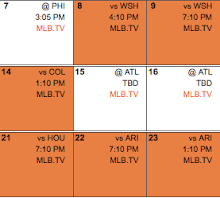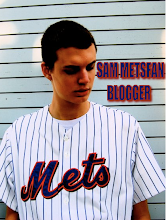Today's history lesson is on David Wright -- specifically, pronouncements on David Wright's outlook, both in the short-term and beyond. Many people are saying definitive things about how he will perform in 2010. His overall Mets legacy has been written in stone for years, seemingly from the day the Mets failed to win the NL East in 2007. I think, just as it is for the Mets as a team this season, anyone making such proclamations is doing so on scant evidence indeed. Let's start with the issue of what can be expected from David Wright in 2010. There appear to be two camps: Doomsayers who believe 2009 represents the new level of play from David Wright, and those who believe 2009 was a complete aberration, and Wright will return to his previous levels. Count me as far closer to the latter camp. Wright was not merely excellent from 2005-2008, he was remarkably consistent. By OPS+, he was at 139, 133, 149 and 141. By home runs: 27, 26, 30, 33. Even his strikeouts were remarkably stable: 113, 113, 115, 118. Still, the reason I can't simply assume that unbroken trend of excellence will continue into 2010 is that it is no longer unbroken. 2009 happened. And there's still no explanation for it. No injury has been diagnosed, no theory of Citi Field, either through direct statistical evidence or indirect psyching-out, holds much credence, and no other reason has come forward, either. In other words, just as with the other top Mets players, David Wright's trajectory for the upcoming year is still to be determined. Of course, that storyline writ large over his entire career is still in flux as well. That may be hard to fathom, given the years of relentless pounding Wright has taken for failing to provide leadership with the Mets, whatever that means, and the team's well-publicized failures in reaching the playoffs, let alone winning a World Series. But there are plenty of examples detailing just how quickly this can turn around. I was watching the Fourth Inning of Ken Burns' indispensible documentary, Baseball, last night. It is part of the offseason regimen to keep me properly fixed with national pastime until April -- part of my baseball methadone, in other words. What was fantastic to hear were the discussions around Babe Ruth as a hitter, circa 1922, when he was the age David Wright is now. John McGraw of the Giants had figured out how to stop him in the postseason. There were questions about whether his leadership would be enough to help carry the Yankees, who had never won a World Series, to a title. Through his age-27 season, Ruth was a .238 hitter in the World Series with one home run and 15 strikeouts in 63 at-bats. Of course, just a season later, Ruth hit .368 with three home runs against the Giants, and the Yankees won their first World Series. But consider how much grief Ruth got for postseason failures -- and that was even with his unparalleled success as a World Series pitcher for the Boston Red Sox. Obviously, this story repeated itself with Alex Rodriguez in 2009. Unlike Wright, A-Rod also had a steroids issue to deal with, repeated off-field distractions, and the biggest contract in the game, which needed justification. One World Series win was all it took, thus re-affirming my theory that Patrick Ewing's entire Knicks career would have looked different if John Starks could have simply shot the damn ball in Game 7 of the 1994 NBA Finals. But the final comparison I wanted to make was to Mike Schmidt, who is generally regarded as the best third baseman in baseball history. Schmidt was a dominant player for four years, from 1974-1977, then fell off dramatically in 1978, in his age-28 season. Even worse, he failed miserably in three postseason appearances with the Phillies, all losses, hitting just .182 in 44 postseason at-bats without a single home run. Considering that David Wright is often blamed for the twin collapses of 2007 and 2008 -- never mind his batting lines in those respective Septembers of .352/.432/.602 and .340/.416/.577 -- one can only imagine how set various media and fans alike would be on castigating Wright if he'd failed at Mike Schmidt levels. Of course, Schmidt went on to have a monster 1979, and after the Phillies won the World Series in 1980, his spot in history was secure. So, strange as it may seem given the thousands of words already spilled about the finest everyday player in Mets history, the Wright story is still to be written. Wright is younger than Schmidt, A-Rod or Babe Ruth were when they altered the trajectory through which history viewed them forever. It says here that the smart money is on David Wright's doing his part to make a similar leap. Far less clear is if his surrounding team can follow, or if 2010 and beyond will be a larger-scale version of Wright's excellent Septembers, cast to the dust bin of history by the failings of his teammates.
Tuesday, February 23, 2010
Subscribe to:
Post Comments (Atom)









No comments:
Post a Comment